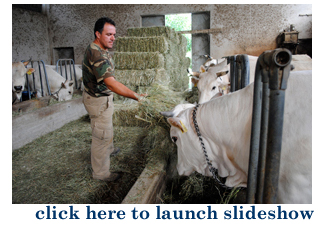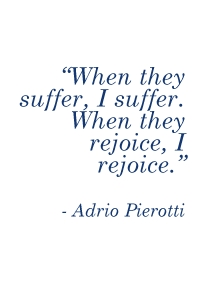Adrio Pierotti: Marchigiana Cattle Farmer
by Theresa Carpine
On a hill two kilometers outside of Cagli, Adrio Pierotti feeds wheat, barley and alfalfa to 30 Marchigiana cows that eat three times a day. He grows, harvests and bales the crops himself on his cattle farm, a 200-year-old family operation known as Trebbio. Adrio devotes 15 acres of the 57-acre farm to crops. Trees cover the rest of the acreage, and he cuts some each winter to sell. He keeps the cows in a barn 10 meters from the home  where he was born. Adrio has lived at Trebbio his whole life.
where he was born. Adrio has lived at Trebbio his whole life.
When Adrio wakes up each day at 5 a.m. to drink his coffee before starting his chores, the cows call to him for their breakfast. “When I show up, they get excited,” he says. While the cows do not have names, Adrio knows them by their personalities. Some of the cows are nice, and some act up. “When they suffer, I suffer. When they rejoice, I rejoice,” he says. “They become part of you, of your family.”
Adrio learned cattle ranching from his father Emilio, whom Adrio describes as a “great man” and a “good leader.” Although he studied accounting, Adrio never wanted to do anything but raise cows. He and his father worked together until Emilio, now 82-years-old, retired two years ago. Adrio says the farm was tidier when his father could tend to the animals, so Adrio could grow crops and maintain the rest of the farm. Now Adrio does everything alone. His father is too tired, and his wife Sibilla is busy taking care of their children and in-laws. Adrio is more mechanical than his father and uses tractors to work, but he does not always have time for basic upkeep on the farm.
Along with raising cows and growing crops, Adrio keeps an organic garden to produce vegetables for his family. He keeps chickens for eggs and meat and also raises geese, pigeons and peacocks. “Kings used to eat peacock meat,” Adrio says, but he does not like eating them because the birds are such good pets, even though the neighbors complain about their noise.
Trebbio is one of 600 small cattle farms in Italy’s Le Marche region that belong to Bovinmarche, a breeder’s co-operative dedicated to producing high-quality beef raised without genetically modified feed. The co-op takes the cattle to slaughter in September when males are at least 20-months-old, and females are no more than 18-months-old. Adrio says 24-month-old males provide the best meat. The males weigh up to 10 tons, and the females weigh six-and-a-half tons. He also keeps 13 breeding cows for five to ten years. Each usually gives birth to one calf per year.
Adrio says his small ranch does not qualify for the farming subsidies available to large corporations, so he is unable to make improvements that would increase productivity. His dream is to build a fence around his pasture. Although cows grow fatter faster in a barn, Adrio would like to let his cows roam outside instead of keeping them chained inside.
Without any sons to continue the family trade, Adrio says he worries what will happen to the farm when his daughters, 8-year-old Sofia and 5-year-old Elena, grow up. “Nobody wants this job,” Adrio says. “The work is too rough. In the city, it’s easy money.”
Adrio says that if he weren’t so attached to the animals, he wouldn’t do the work. “I see life from birth to death, growth from little veal to big bull,” he says. “I see the whole process, the cycle of life, and I appreciate it.”
Adventure with Us!








